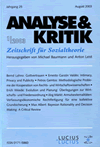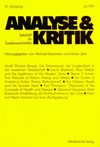Suchergebnisse
"John O\'Neill"
Titel: Logical Empiricism as Critical Theory? The Debate Continues
Autor: John O'Neill / Thomas Uebel
Seite: 379-398
Abstract: Is logical empiricism incompatible with a critical social science? The longstanding assumption that it is incompatible has been prominent in recent debates about welfare economics. Sen’s development of a critical and descriptively rich welfare eco nomics is taken by writers such as Putnam, Walsh and Sen to involve the excising of the influence of logical empiricism on neo-classical economics. However, this view stands in contrast to the descriptively rich contributions to political economy of members of the left Vienna Circle, such as Otto Neurath. This paper considers the compatibility of the meta-theoretical commitments of Neurath and others in the logical empiricist tradition with this first-order critical political economy.
Titel: Citizenship, Well-Being and Sustainability: Epicurus or Aristotle?
Autor: John O'Neill
Seite: 158-172
Abstract: The paper addresses two questions central to recent environmental political thought: Can a reduction in consumption be rendered compatible with a maintenance or improvement of well-being? What are the conditions for a sense of citizenship that crosses different generations? The two questions have elicited two conflicting responses. The first has been answered in broadly Epicurean terms: in recent environmental thought appeal has been made to recent hedonic research which appears to show that improvements in sub jective well-being can be decoupled from increased material consumption. The second has usually been answered in broadly Aristotelian terms: republicans have suggested that a public world and pro jects that are shared over generations are a condition of human well-being. These Epicurean and Aristotelian responses appear to look in opposite directions. They start from different accounts of well-being and appear to look in different places for human flourishing. This paper suggests that the broadly Aristotelian response is in fact owed to both problems. It shows that recent empirical researchinthehedonictraditioncanberenderedconsistentwith that Aristotelian response.
Titel: Self-love, Self-interest and the Rational Economic Agent
Autor: John O'Neill / Thomas Uebel
Seite: 184-204
Abstract: Hume has a special place in justifications of claims made for rational choice theory to offer a unified language and explanatory framework for the social sciences. He is invoked in support of the assumptions characterising the instru-mental rationality of agents and the constancy of their motivations across different institutional settings. This paper explores the problems with the expansionary aims of rational choice theory through criticism of these appeals to Hume. First, Hume does not assume constancy. Moreover, Hume's sensitivity to the relationships be-tween institutional setting and individual motivation owes something to the relative transparency of the plural language of vices and virtues that he employs. Second, rational choice theory's minimal modification of Hume's account of the relation of reason and the passions through the introduction of constraints of consistency on preferences is unstable.
Titel: Preferences, Virtues, and Institutions
Autor: John O'Neill
Seite: 202-216
Abstract: Public choice theory presents itself as a new institutional economics that rectifies the failure of the neo-classical tradition to treat the institutional dimension of economics. It offers criticism of both neo-classical defenders of cost-benefit analysis and their environmental critics. Both assume the existence of benign political actors. While sharing some of its scepticism about this assumption, this paper argues that the public choice perspective is flawed. The old institutionalism of classical economics provides a better perspective to examine both explanatory and normative problems occasioned by environmental problems than does the new institutionalism, raising significant questions about the relationship between environmental goods, virtues and institutions which have been lost to recent discussion.
Titel: Comment on John O'Neill
Autor: Rudolf Schüßler
Seite: 217-219
Abstract: The comment focusses on O,Neills advocacy of Classical Institutionalism (CI) and the problems of the ideal-regarding approach to the construction of institutions. It maintains that CI shows no signs of progress which would justify a renewed exclusive interest in this paradigm and that the ideal-regarding approach needs some consequentialist balancing to avoid obvious risks of totalitarian denaturation.

Ecological Goals and Liberal Ideals: Harmony or Conflict?
2006 (28) Heft 2
Guest-Editor: Thomas Schramme
Editorial
Liberty, equality, justice and solidarity are traditional political ideals of modern Western democracies. Different traditions and parties have supported different models in order to harmonise them. In contrast to the prevalence and long history of these values, ecological goals and needs have moved onto the political agenda fairly recently. Hence it should not come as a surprise that there is no consensus about the compatibility of ecological ambitions with common Western political ideals. Righ...

Kosten-Nutzen-Analyse und Umweltgüter / Cost-Benefit Analysis and the Environment
1994 (16) Heft 2
Editorial
Die Kosten-Nutzen-Analyse ist eine in den verschiedensten Bereichen der Politik angewandte Methode, um bürokratische und planerische Entscheidungen zu unterstützen. In ihren wissenschaftlichen Grundlagen entstammt die Kosten-Nutzen-Analyse der Ökonomie. Ihre Verwender verfolgen die Absicht, die Theorie des idealen Marktes auf solche Güter und ihre Nutzung zu erweitern, für die es keinen realen Markt gibt. So sollen öffentliche Güter, wie etwa die natürliche Umwelt, mit Hilfe der Kosten-N...